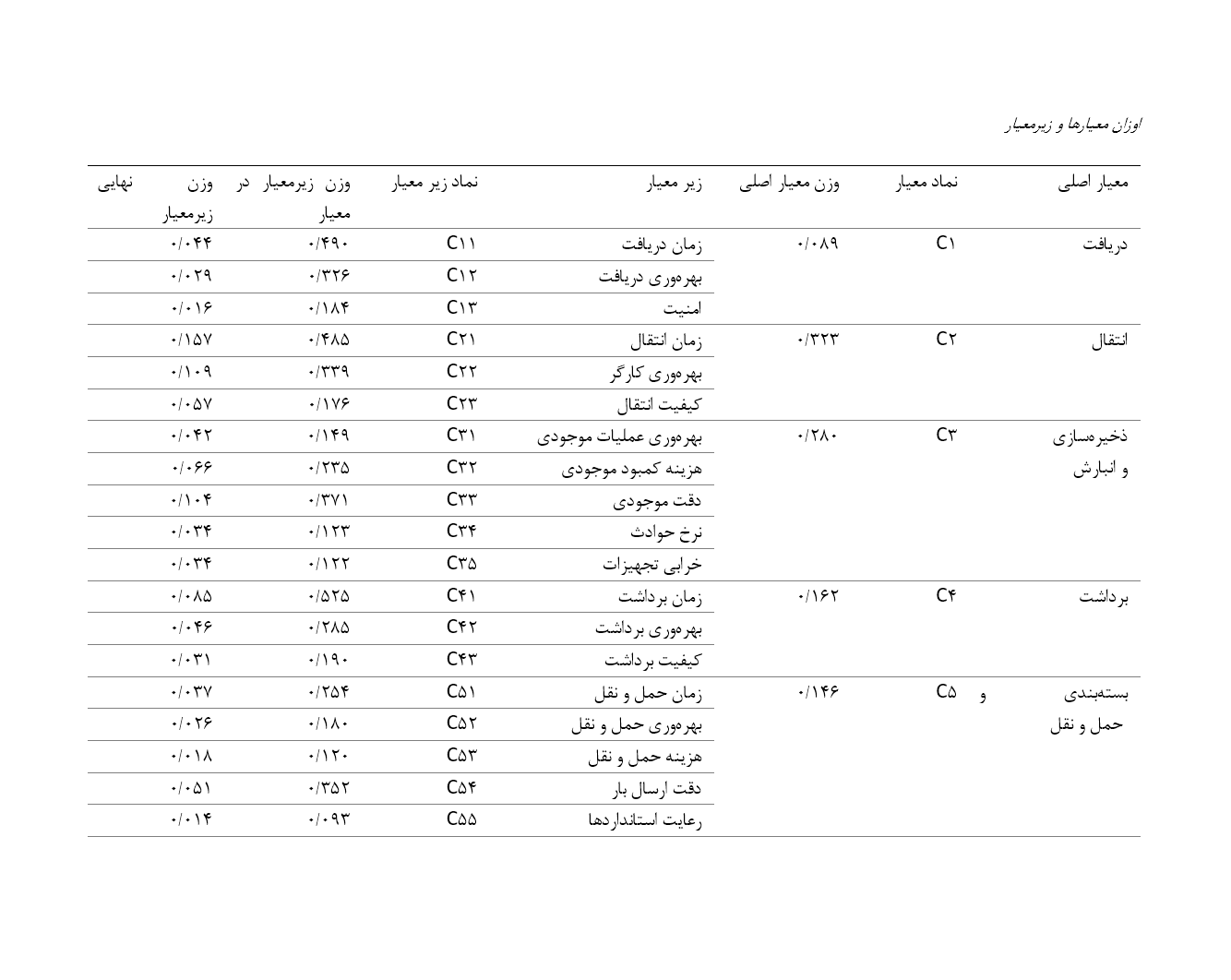Identifying and Ranking Performance Evaluation Criteria of Retail Warehouses Using the Fuzzy Best-Worst Method
Abstract
Efficient management of retail warehouses is associated with multiple challenges, and identifying key criteria for evaluating the performance of these warehouses is of particular importance. The primary research question in this study is: which criteria are more important for evaluating the performance of retail warehouses? In this study, performance-related criteria were initially identified and extracted through a comprehensive review of the literature and analysis of previous research. Subsequently, these criteria were evaluated using the fuzzy Delphi method and expert opinions in the field. In the next step, the validated criteria were ranked and prioritized using the fuzzy Best-Worst Method (FBWM) to determine the relative importance of each criterion. The results of the study indicated that inventory accuracy and transfer time are of high importance and have a direct impact on warehouse productivity and cost reduction. Additionally, labor productivity, picking time, stockout cost, and transfer quality were among other important factors, highlighting the role of human efficiency in improving warehouse performance. Criteria such as transportation cost, safety, and compliance with standards were considered less important compared to others. These findings are consistent with many previous studies and emphasize that accurate inventory management and optimization of warehouse processes are essential for enhancing efficiency. These results can assist managers in making better decisions aimed at improving warehouse performance and increasing customer satisfaction.
References
Abdul Rahman, N. S. F., Karim, N. H., Md Hanafiah, R., Abdul Hamid, S., & Mohammed, A. (2023). Decision analysis of warehouse productivity performance indicators to enhance logistics operational efficiency. International Journal of Productivity and Performance Management, 72(4), 962-985. https://doi.org/10.1108/IJPPM-06-2021-0373
Ali, S. S., Kaur, R., & Khan, S. (2023). Evaluating sustainability initiatives in warehouse for measuring sustainability performance: an emerging economy perspective. Annals of Operations Research, 324(1), 461-500. https://doi.org/10.1007/s10479-021-04454-w
Al-Rikabi, Y. K., & Montazer, G. A. (2024). Designing an e-learning readiness assessment model for Iraqi universities employing Fuzzy Delphi Method. Education and Information Technologies, 29(2), 2217-2257. https://doi.org/10.1007/s10639-023-11889-0
Amorim‐Lopes, M., Guimarães, L., Alves, J., & Almada‐Lobo, B. (2021). Improving picking performance at a large retailer warehouse by combining probabilistic simulation, optimization, and discrete‐event simulation. International Transactions in Operational Research, 28(2), 687-715. https://doi.org/10.1111/itor.12852
Bajec, P., Tuljak-Suban, D., & Bajor, I. (2020). A warehouse social and environmental performance metrics framework. Promet-Traffic&Transportation, 32(4), 513-526. https://doi.org/10.7307/ptt.v32i4.3390
Barasin, A. M., Alqahtani, A. Y., & Makki, A. A. (2024). Performance Evaluation of Retail Warehouses: A Combined MCDM Approach Using G-BWM and RATMI. Logistics, 8(1), 10. https://doi.org/10.3390/logistics8010010
Boysen, N., de Koster, R., & Füßler, D. (2021). The forgotten sons: Warehousing systems for brick-and-mortar retail chains. European Journal of Operational Research, 288(2), 361-381. https://doi.org/10.1016/j.ejor.2020.04.058
Burinskienė, A., & Lerher, T. (2021). Improving retail warehouse activity by using product delivery data. Processes, 9(6), 1061. https://doi.org/10.3390/pr9061061
Danacı, M., & Yıldırım, U. (2023). Comprehensive analysis of lifeboat accidents using the Fuzzy Delphi method. Ocean Engineering, 278, 114371. https://doi.org/10.1016/j.oceaneng.2023.114371
Ding, C., Liu, L., Zheng, Y., Liao, J., & Huang, W. (2022). Role of Distribution Centers Disruptions in New Retail Supply Chain: An Analysis Experiment. Sustainability, 14(11), 6529. https://doi.org/10.3390/su14116529
Dixit, A., Routroy, S., & Dubey, S. K. (2020). Measuring performance of government-supported drug warehouses using DEA to improve quality of drug distribution. Journal of Advances in Management research, 17(4), 567-581. https://doi.org/10.1108/JAMR-12-2019-0227
Dokoohaki, F., Ebrahimi, & Askarifar, K. (2023). Functional Bottlenecks of Wholesaler – Retailer Two Tiered Supply Chain in Distribution Channel of Food Production. Supply Chain Management, 24(76), 75-87.(In Persian). https://dorl.net/dor/20.1001.1.20089198.1401.24.76.5.6
Gafner, A., Loske, D., & Klumpp, M. (2021). Efficiency measurement of grocery retail warehouses with DEA. In Adapting to the Future: Maritime and City Logistics in the Context of Digitalization and Sustainability. Proceedings of the Hamburg International Conference of Logistics (HICL), Vol. 32 (pp. 317-348). Berlin: epubli GmbH. https://doi.org/10.15480/882.4008
Gautié, J., Jaehrling, K., & Perez, C. (2020). Neo-Taylorism in the digital age: workplace transformations in French and German retail warehouses. relations industrielles/industrial relations, 75(4), 774-795. https://doi.org/10.7202/1074564ar
Ghasemi, R., Akhavan, P., Fatahi valilai, O., & Abbasi, M. (2023). Improved supplier-managed inventory order assignment platform enabled by Blockchain Technology. Research in Production and Operations Management, 14(3), 91-115. https://dorl.net/dor/20.1001.1.29810329.1402.14.3.4.2
Guo, S., & Zhao, H. (2017). Fuzzy best-worst multi-criteria decision-making method and its applications. Knowledge-based systems, 121, 23-31.
https://doi.org/10.1016/j.knosys.2017.01.010
Faveto, A., Traini, E., Bruno, G., & Lombardi, F. (2021). Development of a key performance indicator framework for automated warehouse systems. IFAC-PapersOnLine, 54(1), 116-121. https://doi.org/10.1016/j.ifacol.2021.08.013
Kembro, J. H., & Norrman, A. (2020). Warehouse configuration in omni-channel retailing: a multiple case study. International Journal of Physical Distribution & Logistics Management, 50(5), 509-533. https://doi.org/10.1108/IJPDLM-01-2019-0034
Klumpp, M., & Loske, D. (2021). Sustainability and resilience revisited: Impact of information technology disruptions on empirical retail logistics efficiency. Sustainability, 13(10), 5650. https://doi.org/10.3390/su13105650
Marques, P. A., Jorge, D., & Reis, J. (2022). Using lean to improve operational performance in a retail store and e-commerce service: A Portuguese case study. Sustainability, 14(10), 5913. https://doi.org/10.3390/su14105913
Mirnejad, R., pooya, A., & Motahari Farimani, N. (2019). Designing a DEA Model for Evaluating Performance for Hierarchal Decision Making Units with Weighting Attribute in Hypermarket Departments. New Marketing Research Journal, 8(4), 69-94.(In Persian). https://doi.org/10.22108/nmrj.2019.106095.1387
Muricho, M. W., & Mogaka, C. O. (2022). Drone technology and performance of retail logistics. Journal of Sustainable Development of Transport and Logistics, 7(1), 73-81. https://doi.org/10.14254/jsdtl.2022.7-1.6
Naghipour, M. S., Rahim, Z. A., & Iqbal, M. S. (2024). A 5G competency model based on the fuzzy Delphi method. Journal of Infrastructure, Policy and Development, 8(10), 6788. https://doi.org/10.24294/jipd.v8i10.6788
Polim, D. N., & Lestari, Y. D. (2023). Business Process Reengineering to Excellence Warehouse Management System: A Case Study of Retail Industry. Jurnal Syntax Transformation, 4(1), 92-109. https://doi.org/10.46799/jst.v4i1.686
Rahmati, H., & Ramezani, S. (2021). Inventory Management System and Spare Parts Warehouse Assessment Framework and Roadmap (MRO-iREAM). Supply Chain Management, 23(70), 71-90.(In Persian). https://dorl.net/dor/20.1001.1.20089198.1400.23.70.5.7
Ramirez-Malule, D., Jaén-Posada, J. S., & Villegas, J. G. (2021). A System Dynamics Model for Warehouse Performance Measurement with Highly Seasonal Demand and with Long and Short Life Products. In Proceedings of the International Conference on Industrial Engineering and Management, Sao Paulo, Brazil (pp. 5-8). https://doi.org/10.46254/SA02.20210590
Rejeb, A., Rejeb, K., Keogh, J. G., & Zailani, S. (2022). Barriers to blockchain adoption in the circular economy: a fuzzy Delphi and best-worst approach. Sustainability, 14(6), 3611. https://doi.org/10.3390/su14063611
Rezaei, J. (2015). Best-worst multi-criteria decision-making method. Omega, 53, 49-57. https://doi.org/10.1016/j.omega.2014.11.009
Rezaei, J. (2016). Best-worst multi-criteria decision-making method: Some properties and a linear model. Omega, 64, 126-130. https://doi.org/10.1016/j.omega.2015.12.001
Salhieh, L., & Alswaer, W. (2022). A proposed maturity model to improve warehouse performance. International Journal of Productivity and Performance Management, 71(8), 3724-3746. https://doi.org/10.1108/IJPPM-01-2021-0043
Tahmasebi Z, Tajvar M, Arab M. Performance Evaluation of the Central Stores of Hospitals Affiliated to Tehran University of Medical Sciences in 2018. jhosp 2019; 18 (1):21-32.(In Persian). http://jhosp.tums.ac.ir/article-1-6098-fa.html
Tian, X., Wang, H., & Erjiang, E. (2021). Forecasting intermittent demand for inventory management by retailers: A new approach. Journal of Retailing and Consumer Services, 62, 102662. https://doi.org/10.1016/j.jretconser.2021.102662
Vatumalae, V., Rajagopal, P., Sundram, V. P. K., Munir, Z. A., & Ghapar, F. (2023). Linking Factors Leading to Retail Hypermarket Warehouse Operations Performance in Malaysia. SMART Journal of Business Management Studies, 19(1), 1-9. http://dx.doi.org/10.5958/2321-2012.2023.00001.5
Vatumalae, V., Rajagopal, P., Sundram, V. P. K., & Hua, Z. (2022). A study of retail hypermarket warehouse inventory management in Malaysia. SMART Journal of Business Management Studies, 18(1), 71-79. https//doi.org/10.5958/2321-2012.2022.00009.4
Velayatzadeh, M.(2017). An overview of the importance and necessity of health and safety of food warehouses. The 10th student conference of new health sciences of the country.Tehran.(In Persian). https://civilica.com/doc/614655/

Downloads
Published
Submitted
Revised
Accepted
Issue
Section
License
Copyright (c) 2025 The Decision Science and Intelligent Systems

This work is licensed under a Creative Commons Attribution-NonCommercial 4.0 International License.






